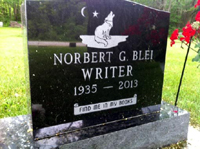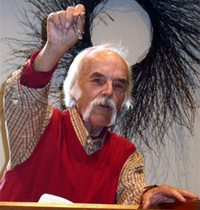
NOTES from the UNDERGROUND No. 189 | July 8, 2009
(small press reviews #3)
RIES REVIEWS:
Michael Kriesel, William Taylor Jr. & Karla Huston
 The Light of Fields by: Michael Kriesel, 31 Poems / 68 Pages, Price: $5 (includes shipping), Propaganda Press / “Pocket Protector Series”, P.O. Box 398058, Cambridge, MA 02149. Review by Charles P. Ries
The Light of Fields by: Michael Kriesel, 31 Poems / 68 Pages, Price: $5 (includes shipping), Propaganda Press / “Pocket Protector Series”, P.O. Box 398058, Cambridge, MA 02149. Review by Charles P. Ries
“The Light of Fields” by Michael Kriesel was originally published in 1982 by Jump River Press, Inc. out of Prentice, Wisconsin when Kriesel was just twenty years old. It was one of Kriesel’s first books of poetry and gave me the opportunity to visit this writer early in his career. One can certainly see the same careful, spare, almost Haiku quality to many of Kriesel’s poems, and one also finds his wonderful ability to extract unique and unfolding metaphors from the heart of rural Wisconsin. I don’t think any poet writing today can draw image from the rural farming environment like Kriesel. But what I also found was a young man focused on romance, reflecting on marriage. I often think that first poems are the most personal. They are the fertile ground from which art grows. If one reads Kriesel more recent books of poetry, we see him dancing between forms, extending forms, getting us lost in his numinous meanings, but in “The Light of Fields” we find Kriesel looking around and discovering his world for the first time.
Here is his wonderful title poem, “The Light of Fields”:
“Wholly knowing the grasses sure / growing // the earth holding green breathing / beings toward morning / against the far dark between stars // and supporting each separate stem / bent away from the sun // Knowing these by the earth in you / deep with the nights of our sleep / and the light of these fields in you / easy I rest in your grain //Wholly knowing these grasses grow / over all death // and the delicate skeletons covered by / green raising past them // I love you / and lie down in your fields // unafraid of grass rising to cover me.”
Let me also say this is a tiny book of poetry – just two inches by two and three quarters inches square. Leah Angstman who is the publisher of Propaganda Press calls it her “Pocket Protector Series”. This is the seventh in her Pocket Protector Series. And while this book is tiny, it is packed with poetry. This was a wonderful opportunity to visit a writer as a young man and discover that his early work foretold the bright future Kriesel continues to have.
 WORDS FOR SONGS NEVER WRITTEN: NEW AND SELECTED POEMS by: William Taylor Jr., 126 Poems/196 Pages/$13.95, Centennial Press, Charles Nevsimal, Publisher, P.O. Box 170322, Milwaukee, WI 53217-8026. Review by Charles P. Ries
WORDS FOR SONGS NEVER WRITTEN: NEW AND SELECTED POEMS by: William Taylor Jr., 126 Poems/196 Pages/$13.95, Centennial Press, Charles Nevsimal, Publisher, P.O. Box 170322, Milwaukee, WI 53217-8026. Review by Charles P. Ries
“Words for Songs Never Written” is big, deep, and beautiful. In the small press, where doing everything on no budget is the norm; it is wonderful to see a publication that “looks” as good as this one. It is a perfect melding of content and medium moving a great book of poetry to another level. So who better to publish this full collection than Charles Nevsimal of Centennial Press, who has made a business of migrating anything between two covers into both visual and literary art. In “Words for Songs Never Written”, William Taylor Jr. weeps in the mist of poetic transcendence as he examines the common miracles that live within and near each of us.
I first encountered Taylor’s work eight years ago when I discovered his poem “Being Lonely” in Zen Baby (this poem also appears in this collection). It was such a remarkable poem of searching sadness that I never forgot it. “Words for Songs Never Written” again demonstrates why Taylor has attracted such a devoted following and such high praise from throughout the independent press. In his poem, “Eyes Like Something Lost” he writes,
“I didn’t know her / I had never seen her before // but there was something / in her voice / and in her eyes // there was something / in the clothes she wore / and the way she moved // something in her way of speaking // that instantly told me / she was damaged // I felt a sudden kinship of sorts / for I am the same way / myself // I watched her from across the room / and wondered what the world / had done to her // I imagined the two of us / sitting in some quiet room / smoking and drinking / telling stories / ’til 4 a.m. // she had a frightened smile / she had eyes like something lost // and she was gone before / I could tell her she was / beautiful.”
I asked him how he walks the line between pathos and hope, without falling subject to cliché. He told me, “In much of my work there is a certain mood or feeling I want to convey and I simply try to use the best words possible to do so. I don’t know how else to explain it. I do believe there is sadness in beauty and sometimes beauty in sadness. To quote Thomas Hardy, If a way to the best there be, it exacts a full look at the worst. Meaning, the dark aspects of life must be confronted and accepted before any real peace of mind or happiness can be achieved. A kind of peace must be made with the darkness.”
This collision of darkness and light, sadness and hope is well reflected in his poem, “Early Morning Just Before The Dawn”:
“The bus moves along the freeway / beneath grayblue clouds / fading stars / and wisps of pink // I’m rarely up before noon / so I don’t see this kind of thing / too often // there is something in me that imagines / if everything cold remain / just like this / things would work out / in spite of it all / but the sun crawls red / and slow to the horizon / like a wounded god / and soon, too soon, / all the bloody trouble will begin.”
Taylor stands back from the world, sees its pain, its many blemishes, and yet celebrates the inevitable beauty of it all. When I was reading this collection I was reminded of the great small press poet, Albert Huffstickler, who passed away in 2002 and called poetry the sharing of “holy secrets.” I believe that great poetry and poets convey this almost mystical essence in their work. It is what draws me and keeps me reading writers like Taylor. It is remarkable that Taylor, who just turned 40 years of age, can write with such life weary maturity. I am eager to see how he will continue to elevate and explain his pain, longing, and his unrequited search for perfect redemption. This is a wonderful poet, and great book of poetry.
 AN INVENTORY OF LOST THINGS by: Karla Huston, 32 Pages / 23 Poems, Price: $8, Centennial Press, P.O. Box 170322, Milwaukee, WI 53217. Review/Interview by Charles P. Ries
AN INVENTORY OF LOST THINGS by: Karla Huston, 32 Pages / 23 Poems, Price: $8, Centennial Press, P.O. Box 170322, Milwaukee, WI 53217. Review/Interview by Charles P. Ries
Women have a distinct view of the erotic and love’s secrets. In reading Karla Huston’s new book of poetry, “An Inventory of Lost Things”, I enter into the ebb and flow of feminine romantic imagination. While not all of twenty-three poems of this collection focus on the heart’s yearning, a good number do and comprise the central theme of this eloquently written book of poetry.
Huston approaches her topic from a number of angles. In final stanza of her poem “The One on The Left” she says,
“But you can’t take your mind off the boy, / barely twenty, going on the rest of his life – / going off for an afternoon at the shore. God knows / what they’ll do on the blanket / when it’s floated behind the vine-covered fence.” And again these lines taken from the closing of her poem, “Your Marie”: “You should know her hair was chestnut, / a flag of copper stars glittering / against the curve of her neck / and the strand that kissed her cheek / I knew you’d kissed when she left you / for the last time while her hips rolled / when she walked away / and her breast swayed in dreams / even now the ones you prayed into.”
Her book of poetry would easily fall into the category of great chic lit. Huston poems are thoughtfully narrative and carefully designed. There is no spare air in these poems. Each is complete from beginning to end.
I am reminded, as I read this collection, of the seminal book on women’s sexual fantasies, My Secret Garden by Nancy Friday. Our two genders reflect so differently on the erotic and on romance. Huston is masterful at understanding the sensual wonder world of the woman. As in this section from her poem “Rewind” demonstrates,
“If she could, she’d take the first / bus out of happyland, find her own / little place and read sweaty novels / for the rest of her life. He’s weary / of the honey-I’m-homes / and the honey-dos and the honeyed / hams.” And again from this section of her poem, “The Plastic Surgeon’s Wife”: “When they make love, she fears / how he’d like to improve her – / a little lift there, a little tighter there, / fill her breasts with vanilla, / admire the suction in her soul — / his reservoir, never full.”
This is a wonderful exploration of the feminine mind, by a writer uniquely suited to explore this undulating landscape of passion, yearning, and lost things.
More on Karla Huston can be fond on here web site by clicking here…
![]()
 Charles P. Ries
Charles P. Ries
lives in Milwaukee, Wisconsin. His narrative poems, short stories, interviews and poetry reviews have appeared in over two hundred print and electronic publications. He has received four Pushcart Prize nominations for his writing. He is the author of THE FATHERS WE FIND, a novel based on memory and five books of poetry — the most recent entitled, The Last Time which was released by The Moon Press & Publishing. He is the poetry editor for Word Riot. He is on the board of the Woodland Pattern Bookstore and a member of the Wisconsin Poet Laureate Commission. But most of all he is a founding member of the Lake Shore Surf Club, the oldest fresh water surfing club on the Great Lakes. You may find additional samples of his work by going to: http://www.literati.net/Ries/






























































I’ve long been a fan of William Taylor Jr’s writings. It’s so nice to see him get the kudos I feel he well deserves. Thank you for reviewing such a deserving artist!